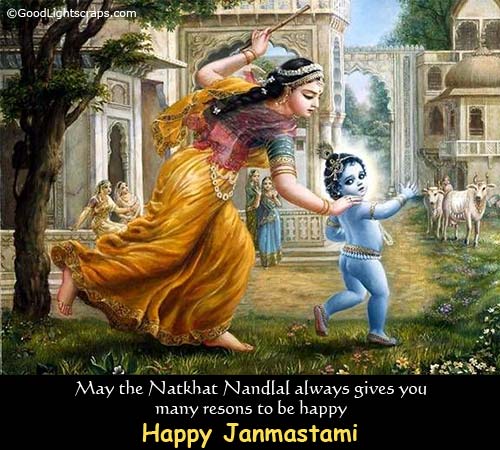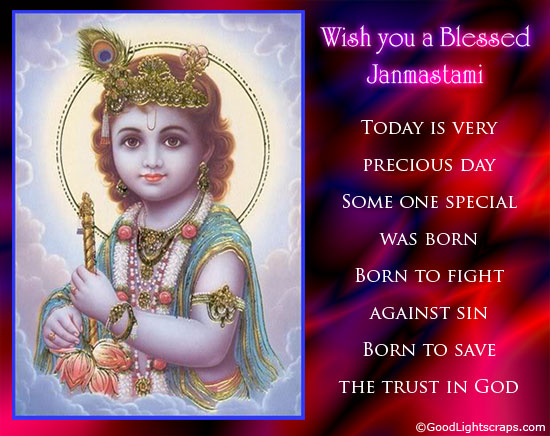Happy Janmashtami To All

Purpose of Incarnation
In the Gita (4/78) the Lord has ordained:
"Yadaa yadaa hi dharmasya glanir bhavati Bharat;
Dharma sansthaapanaarthaaya sambhaavami yuge yuge."
i.e. I incarnate whenever Dharma declines and evil predominates, to establish Dharma and vanquish evil.
In the Bhavishyottara Puran Shri Krishna himself extols the celebration of Janmashtami to Yudhishtir, the eldest of the five Pandavas.
He incarnated in Mathura (Uttar Pradesh) to vanquish the evil King Kansa and other evil elements who were harassing pious people. His second reason was to fulfil the pledge he had given to Vasudev and Devki. When they married Kansa heard a divine proclamation that the couple's eighth son would be his nemesis. To obviate this, Kansa imprisoned the couple and killed the first seven sons born to Devki. When Shri Krishna was born Vasudev placed him in a cradle and took the baby child through the river Yamuna. Thus the Lord survived and eventually vanquished Kansa and other evil elements.
Ideal Devotee
In the Gita (18/54), the Lord stipulates:
"Brahma bhootaha prasannaatmaa na shochati na kaankshati,
Samaha sarveshu bhuteshu madbhaktim labhate param."
i.e. One who becomes 'Brahmarup' and offers devotion to Parabrahma (God), he forever remains blissful and attains the highest glory of God. 'Brahmarup' simply means to become the ideal devotee like Arjun who represents 'Nar' to then worship Krishna - Narayan. Hence the murtis of Nar-Narayan. Similarly, Shri Krishna played the 'Maha Raas' traditional (stick folk dance) with the Gopis of Vrundavan because of their unalloyed love for him. Radha was the foremost among them. Therefore devotees should develop 'Gopi-bhav', to become Radha-rup (like Radha) to worship Shri Krishna. Hence devotees everywhere also consecrate murtis of 'Radha-Krishna' in mandirs, worshipping the Lord with his consort or choicest devotee.
In addition to such surrenderance, how should the devotee strive to attain 'Gopi-bhav' to please the Lord?
Satsang
In the Srimad Bhagwat (11/12/1,2), Shri Krishna himself propounds 'Satsang', which is another important principle in celebrating Janmashtami
"I am not as pleased by endeavors such as: Yoga, Sankhya, scriptural study, austerities, renunciation, altruistic social deeds, donation, fasting, yagna, study of Vedic scriptures, observance of the laws of Dharma and Yama (part of yoga), as I am by Satsang."
'Satsang' means associating with a God realised Sadhu. This was exemplified by King Parikshit when he was cursed to die in seven days, by surrendering to Shukdevji, who was a God-realised sadhu.
Finally, after Shri Krishna's departure from earth, how did the Lord continue his manifestation? This question was posed by Shaunak and other rishis to Suta Purani (in the Bhagwat). He replied, "Dharma resided in the Lord's true sadhu who is the true beholder of Dharma." In the Bhagwat, Shri Krishna supports this when he revealed to Uddhavji: "O Uddhav! You are not any the lesser than me." Thus the Lord revealed Bhagwat Dharma to Uddhavji and since then propagated it through him. The true spirit then, in celebrating Janmashtami is for devotees to do Satsang through the Satpurush who is the beholder of Bhagwat Dharma - in order to realize God within.
Festival & Rituals
- People fast on this day, usually a waterless fast.
- They spend the day immersed in Shri Krishna's glory by reading, reciting and singing his divine leela especially in the evening in mandirs.
- At midnight, the Lord's birth hour, arti is performed. He is also installed in the form of 'Lalji' (child form) in a swing and devotionally offered many sumptuous food dishes. 'Makhan' (butter) is especially included since Shri Krishna loved this in childhood. The traditional prasad is 'Panchajiri' - made of five ingredients: powdered ginger, 'suva', coriander, sugar and ghee. Other ingredients include poppy seeds (khaskhas) and dessicated coconut shavings.
After arti, devotees jubilantly sing and hail kirtans extolling the Lord's incarnation:
- "Nand gher anand bhayo, Jai Kanaiyalal ki ..
Hathi, ghoda, palkhi, jai Kanaiyalal ki '" - "Bawa Nand tane darbar, nobat vaage re lol '
Hari pragatya taaranhaar, nobat vaage re lol'"
Edited by laxmi_avinafan - 14 years ago






